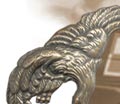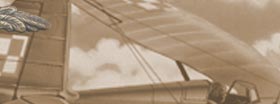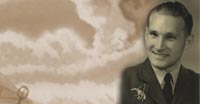Lost Between Worlds
By Edward H. Herzbaum (2010), Matador
UK ISBN 978 1 848766 037
Edward H. Herzbaum was born in Vienna in 1920 to Polish Jewish parents who decided to return to Poland in his early childhood. As a student of architecture in Warsaw Polytechnic, Edward would have witnessed Poland's interwar economic and political struggles of a country been dragged into war with Germany. Like all young men he was required to do some military training in preparation for war. What draws the reader to the book is the detail and contemporary comment tinged with humour and wit despite the depravations and horror he experienced on his journey through the war. The journal was often written clandestinely on scraps of paper and managed to survive many extreme situations until recently re-discovered in a suitcase.
The book opens with Edward's account of the German invasion and his fight in the forests and countryside of Poland where heat, dust and confusion of civilians fleeing the invasion all become entangled with the fleeing ruptured Polish army.
Captured by the Germans' he managed to escape and briefly return home to Łódż before travelling by train to Warsaw. Then with a small party moved further east trying to cross over the Nazi-Soviet border of a divided Poland, which they managed with help and advice from a German captain. After close encounters with Soviet patrols, the small band managed to push their way onto a train and eventually arrived in Lwów. What struck Edward was the colossal array of propaganda on the buildings and in the streets with huge portraits and Soviet flags. The rapid subjugation of the people wearing Soviet emblems as if surrendering to Sovietisation was the only option. A false interlude as a ski instructor masked the desire to re-join the war and the diversionary romance with Krysia made the outcome of arrest and eventual deportation an extraordinary scene to witness within the story being told.
The banal questioning, interrogation and torture by the NKVD is a graphic account interspersed with the misery of starvation, lice and discomfort. Edward’s observations are tinged with stoic humour when in one instance a guard failed to accurately count the prisoners crammed into the railcar. Having escaped from a cart taking him to a labour camp deep in the forest, freedom was elusive. Recaptured and sent to a series of labour camps the account not only focuses on hardship and the brutality, but also the characters within. Edward’s account of life in the gulag equals the seminal work by Anne Applebaum, however, in this book nothing has been altered or edited and reads as ‘fresh’ the day it was scribbled on to scraps of paper and secreted away. A simple swim, the nagging hunger or rumour about bread and the meeting of an urka (Russian gangster) has the reader almost enchanted with the rich tapestry of the tale.
The Polish Government in exile negotiated the release of Polish POW’s held in Russia and on 14th August 1941 a formal pact was signed between them allowing a new Polish army to be formed. Edward like thousands of prisoners were released and made their way south to join ‘Anders Army’. His encounter with the Uzbeks and their ability to allow tradition and culture to survive in the bleak Soviet system was wonderfully described. Or coping with re-training while based in Khanaquin in Iraq where food and necessary items were in plenty are portrayed with simplicity and frankness. The impact or shock of the heat and boredom having survived the gulags is quite poignant. Arrival in the Middle East brought Edward closer to the war. A bout of malaria, which struck down many of Anders troops in Iran or Palestine, enabled Edward to experience a British hospital and its comforts prior being shipped to Nuseirat in Gaza. Melancholia and routine of camp life at times plagued Edward in a number of locations through out the book and it came to tantalize him while on guard duty where the narrative almost has a hallucinatory feel to it. Only more training seemed to break the mood interspersed with trips to Jerusalem, but Edward like many Polish troops seemed to have had enough of the Middle East.
The train trip from Al Khassa to Quassasin in Egypt enabled Edward to reflect that the ‘Promised Land’ held little for him despite his Jewish background and saw the trip as a never-ending road to yet another camp and its laborious routine. Transported by the M.S Dilwara to Taranto in Italy, Edward had little idea the Italian campaign would be long and bloody and also over-shadowed by events in France.
Edward’s description of the front and action around the Monte Cassino sector where his animated description of surviving artillery fire and the destruction a barrage can inflict is some of the best narrative in print and recommend anyone interested in the Italian campaign to read this book. For those researching family history, the joy of reading this book is how Edward has recorded the events and it is immensely important that his ‘army life’ is left in context for what it was. Edward found many of the landscapes impressive and enchanted him on his long journey. Some of his sketches and watercolours are included in the book and the narrative and observations suggests a missed vocation as a travel writer.
More information about the book and author can be found at:
www.lostbetweenworlds-herzbaum.com
Julian Hoseason, editor polandinexile.com





